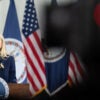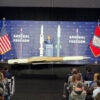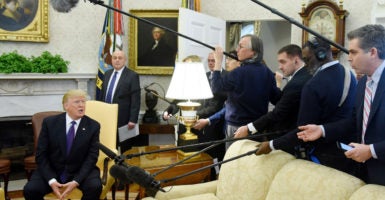As President Donald Trump prepares to hand out the “Fake News Awards” today to his journalist critics, a new study and a separate survey shed light on the negative news coverage of the Trump presidency and how the public defines “fake news.”
“We’ll keep you posted on details around that potential event and what that would look like,” @PressSec says.
On Tuesday, White House press secretary Sarah Huckabee Sanders referred to the awards as a “potential event,” implying it might not happen.
>>> Update: CNN on Top in Trump’s ‘Fake News Awards’
Earlier Tuesday, two former Obama administration lawyers said such an awards show would amount to an ethics violation.
The Fake News Awards, those going to the most corrupt & biased of the Mainstream Media, will be presented to the losers on Wednesday, January 17th, rather than this coming Monday. The interest in, and importance of, these awards is far greater than anyone could have anticipated!
— Donald J. Trump (@realDonaldTrump) January 7, 2018
During Trump’s first year in office, 90 percent of TV news coverage of the president on ABC, NBC, and CBS was negative, according to the Media Research Center, a conservative media watchdog.
“90% of Trump 2017 news coverage was negative” -and much of it contrived!@foxandfriends
— Donald J. Trump (@realDonaldTrump) January 16, 2018
Meanwhile, Republicans are more likely to define perceived biased coverage as fake news compared to Democrats, who are more likely to only view knowingly falsely reported stories as fake, according to a survey on media trust by the Knight Foundation, a journalism nonprofit, and Gallup.
The White House has been mum about the details, regarding questions about categories and who would judge the award “winners.”
“We’ll keep you posted on details around that potential event and what that would look like,” Sanders said Tuesday during the press briefing.
If Trump’s goal was to stir attention, he succeeded.
Norman Eisen, a former special counsel for ethics for President Barack Obama’s White House, and Walter Shaub, the former head of the Office of Government Ethics during the Obama administration, both said the awards could amount to an ethics violation.
WARNING to White House staff: the president may be exempt from the rules at 5 CFR § 2635.701 et seq. on misuse of position BUT YOU ARE NOT. If you help @potus with the below, you risk violating §§ 702, 704 & 705 forbidding use of gov time & $$$ to harm some media & aid others. https://t.co/gHxzJcCEAW
— Norm Eisen (@NormEisen) January 7, 2018
Hey @PressSec & @RajShah45, Norm is right. If you or *ANY* WH staffers work on this or post it on the WH website, it will be a violation of the Standards of Conduct. Beware of laws on using federal appropriations too, if there are any visuals, certificates, handouts, or trophies. https://t.co/3tlyrkNc9H
— Walter Shaub (@waltshaub) January 7, 2018
If the awards do proceed, there is apparently plenty of material, based on the Media Research Center study of network coverage in 2017.
The three big networks devoted about 100 hours of airtime covering Trump, a little more than one-third of all evening news airtime. Of the 5,883 “evaluative statements” made about Trump on those networks, 90 percent were negative, according to the Media Research Center.
Further, the Russia investigation, which the president has consistently called a fake story, was the No. 1 issue of coverage, consisting of 1 in 5 minutes of all Trump coverage, or 20 hours. That compared to 475 minutes on repealing and replacing Obamacare; 364 minutes on North Korea; 258 minutes on border security; 251 minutes on the extreme vetting policy; and 222 minutes on tax reform.
Do you notice the Fake News Mainstream Media never likes covering the great and record setting economic news, but rather talks about anything negative or that can be turned into the negative. The Russian Collusion Hoax is dead, except as it pertains to the Dems. Public gets it!
— Donald J. Trump (@realDonaldTrump) January 16, 2018
The Knight Foundation/Gallup survey found the following.
- On what might seem like a clear definition of fake, in the question of, “People knowingly portraying false information as if it were true,” only 43 percent of Democrats saw this as always fake news, compared to 52 percent of Republicans.
- Conversely, what would seem to not be fake, 42 percent of Republicans consider “accurate news stories that cast a politician or political group in a negative light to always be ‘fake news,’” while just 17 percent of Democrats believe this is always fake news.
- A majority of Republicans, 53 percent, believes “news organizations slanting their stories to promote a certain point of view” is always fake news, while only 20 percent of Democrats believe this.
- Almost half of Republicans believe “journalists reporting stories before they check all their facts and sources to be sure they are accurate,” always constitutes fake news, while only 24 percent of Democrats believe that.
- The survey found that 67 percent of Republicans view fake news as a threat to democracy, while just 49 percent of Democrats believe it is. Further, among those who identified as “very conservative,” 75 percent said it is a “very serious threat to democracy,” compared to just 46 percent of those that counted themselves as “very liberal.”
Trump’s escalating feud with the news media has been a trademark of his presidency. When a group of House Democrats introduced articles of impeachment against Trump in November, one accused the president of “undermining freedom of the press” by calling media organizations “fake news,” for “circulating a video of himself violently wrestling a man covered by the CNN logo,” and for disparaging remarks about TV news hosts Megyn Kelly and Mika Brzezinski.
































One Reply to “Mystery and Controversy Loom Over Trump’s ‘Fake News Awards’”